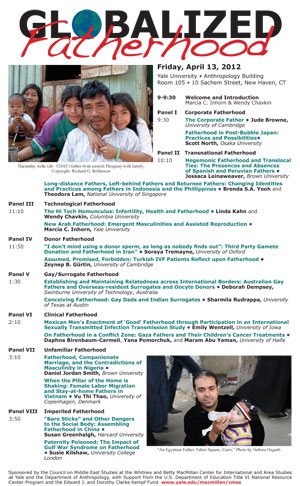
From April 13–15, 2012, scholars from around the world gathered at Yale’s Anthropology department for a conference addressing emergent trends of fatherhood in an increasingly globalized world. The disciplinary backgrounds of the participants were quite diverse, including anthropology, sociology, gender studies, epidemiology/public health, human geography, and obstetrics/gynecology. Organized by Marcia C. Inhorn, William K. Lanman Jr. Professor of Anthropology and International Affairs at Yale, the conference was held as part of a larger effort to expand on the study of masculinities, particularly as it relates to changes in larger social, political, economic, and cultural structures. Sponsored by the Council on Middle East Studies, the conference was generously funded by the Edward and Dorothy Clarke Kempf Fund of the MacMillan Center, as well as CMES’s grant from the U.S. Department of Education Title VI National Resource Center Program.
The first day of the conference was open to the public, so that students, professors and community members could attend the presentations given by distinguished scholars from institutions including University of Oxford, University of Cambridge, National University of Singapore, Osaka University, University of Copenhagen, University College London, and, closer to home, Brown, Harvard, and Columbia, among others. The lectures addressed a number of topics across a wide geographical span, ranging from Gaza fathers caring for their children undergoing cancer treatment in Israel, to the complicated relationships created between Australian gay fathers and Indian surrogate mothers. The presentations were divided into eight different panels, each addressing an overarching theme: corporate fatherhood, transnational fatherhood, technological fatherhood, donor fatherhood, gay/surrogate fatherhood, clinical fatherhood, unfamiliar fatherhood, and imperiled fatherhood.
The second part of the conference, which took place over two days, consisted of a closed workshop designed to discuss precirculated papers written by all of the invited presenters. An hour was dedicated to each paper, constructively exploring suggestions for revision and publication. Inhorn’s hope is that the revised papers produced from this conference will soon be published as part of an edited volume on Globalized Fatherhood, a proposal for which will be submitted to the “Fertility, Reproduction, and Sexuality” series at Berghahn Books, a major anthropological publisher. Such an edited collection of insightful ethnographic explorations will ultimately shed light on the ways that fatherhood is being transformed across the world and the many factors that are catalyzing these changes.
